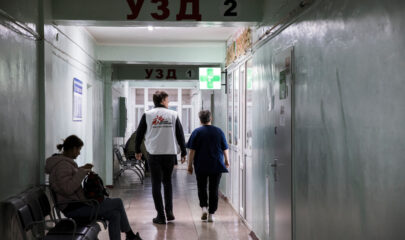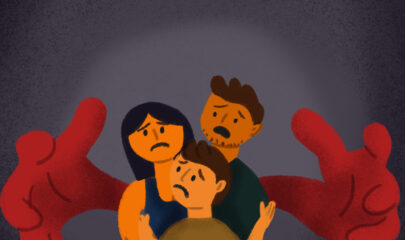
Doctors Without Borders/ Médecins Sans Frontières (MSF) was founded 50 years ago on the belief that everyone has the right to medical care regardless of gender, race, religion, creed or political affiliation, and that people’s health and humanitarian needs outweigh respect for national boundaries. Our medical action is grounded in human-to-human connection; every day we live and reinforce our core principle of humanity as we help deliver babies, counsel people traumatized by war, vaccinate children against deadly diseases, mend wounds and treat tuberculosis. All the while, we refuse to remain silent about the inequities, abuse, violence and neglect that make our work necessary. And unfortunately, our work is no less necessary today than it was 50 years ago.
That MSF continues to play a vital role in a world where human life is routinely neglected, instrumentalized and even destroyed for political or commercial gain brings no comfort. Yet as long as MSF is needed, we must be prepared to deliver our humanitarian support. This means we must continually adapt, reinvent and transform.
MSF is larger than ever, operating in over 70 countries with over 60,000 staff conducting more than 10 million medical consultations per year. The contexts in which we operate are complex and, at times, hostile and the breadth of needs is wide. Meeting the evolving challenges of hands-on humanitarian work demands that we are a continuous learning organization. We must, for example, constantly (re)learn about the shifting, complex and dangerous routes migrants take so that we can offer the best assistance and speak out about the systemic failures causing their vulnerability.
We are also adapting to the reality that climate change and environmental degradation are increasingly driving humanitarian need. This means we are more often applying a climate lens to our operations, and we are acting more environmentally responsible: better managing medical waste and reducing our carbon footprint.
Our response to the COVID-19 pandemic, and the constraints imposed by it, have also spurred changes. We are using the example of COVID-19 vaccine development and roll-out to highlight the brokenness of a pharmaceutical sector that puts profits before public health. We envision an alternate model in which publicly funded medical research leads to available, accessible and affordable public goods.
“That MSF continues to play a vital role in a world where human life is routinely neglected, instrumentalized and even destroyed for political or commercial gain brings no comfort. Yet as long as MSF is needed, we must be prepared to deliver our humanitarian support.”
COVID-19 has also helped fast-track changes to our staffing model. We are now empowering locally recruited staff more than ever, partly in response to COVID-19 travel constraints and as part of a deeper commitment to redress the impact of structural inequities within MSF. In that regard, we are taking a hard look at how we can be a more diverse, equitable and inclusive organization, for example in recruitment, remuneration, leadership representation, as well as in how we engage with local communities and communicate with the Canadian public.
As we mark MSF’s 50th year, we reaffirm the principle of humanity as the driving force that compels all who are part of this movement — the communities we work with, our staff, and supporters like you who make it possible — to act wherever we are most needed in defense of life, health and dignity.

MSF IN ACTION
Ethiopia. Since violence began in Tigray region in northern Ethiopia in early November 2020, some 60,000 people have taken refuge in Sudan and hundreds of thousands have been displaced within Tigray. MSF teams are delivering critical medical care to people affected by the continuing violence, working to reach those who have fled to remote areas for safety. MSF teams have provided healthcare to thousands of displaced people and supported health facilities at the border of Amhara region as well as in Tigray, and are responding to the needs of Ethiopians who have crossed the border into Sudan.
Yellow fever. Giving people a fraction of a yellow fever vaccine is effective and could help vaccinate millions more during outbreaks, says a recent study led by MSF’s research arm Epicentre, published in The Lancet. Clinical trials found giving one-fifth of the standard yellow fever vaccine effective and safe, making it easier to protect people. Approximately 30,000 people die every year from yellow fever, a mosquito-borne acute viral hemorrhagic fever largely affecting sub-Saharan Africa but rising in Central and South America. A small percentage of people infected experience a toxic stage that can cause internal bleeding and severe liver and kidney damage, and half of patients who experience this stage die within days.
Uzbekistan and Tajikistan. In December 2020, MSF international president Dr. Christos Christou made a virtual visit to MSF projects in Uzbekistan and Tajikistan, to understand and support the teams and the communities they are assisting. In Uzbekistan, he toured a lab where tests for tuberculosis (TB) patients are performed. MSF has worked with the Ministry of Health in Uzbekistan for over 20 years. Teams focus on improving diagnosis and treatment for people living with HIV and TB, including drug-resistant TB. In Tajikistan, he accompanied the team on a home visit to a seven-year-old TB patient. MSF supports the Ministry of Health in Tajikistan to provide pediatric and family TB care, focusing on drug-resistant TB.


